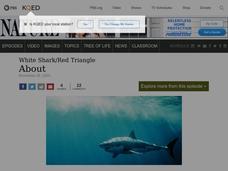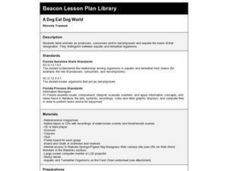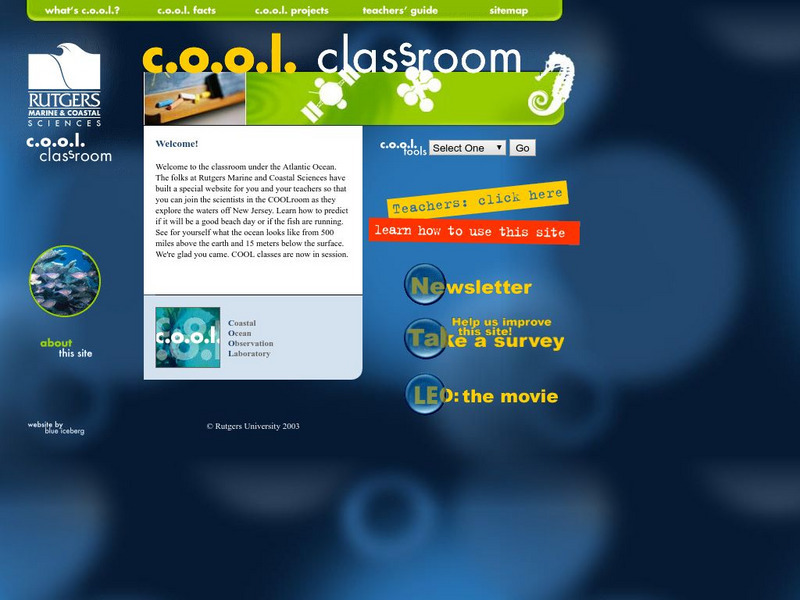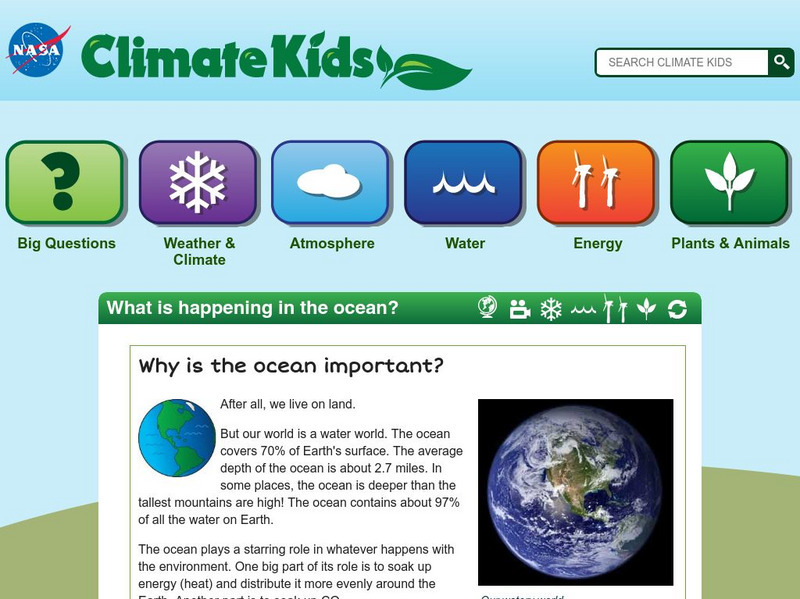Curated OER
Water Pollution
Students explore the causes of water pollution. In this environmental lesson, students conduct experiments with natural filtration systems.
Curated OER
Climate and Change: Fitting the Facts Together and Acting on Them
Students examine climate change. In this current events lesson, students read the provided articles "Key Facts + Key Conclusions=0?" "Oil Companies Fund Climate Change Deniers," and "Acting on Climate Change Facts." Students respond to...
Curated OER
Gone Fishing
Students examine the effects of various methods of fishing on fish populations and biodiversity. They read a handout, participate in a simulation of different fishing methods, record the results, and answer discussion questions.
Curated OER
Shark Attack
Students examine the white shark. They think critically about a set of shark facts and predict whether the statements are true or false. Students describe a year in the life of a white shark living in the Red Triangle. They create a...
Curated OER
Head to Foot
Students describe the body form and major anatomical structures of squids and describe some unusual or unique features of newly-discovered deep water squid species. They infer what types of food squids use from their anatomical features.
Curated OER
Sinking Races
Students build plankton models and compete to see which sinks most slowly. They write, or orally present ,the adaptations they incorporated to slow the sinking rate of their organisms. Race results can be grounds for some prizes!
Curated OER
Whales
First graders investigate two different types of whales; toothed and baleen. They describe what the different types of whale eat. They listen to a cassette of Dyan Sheldon's, The Whale Song before making stick puppets to dramatize the...
Curated OER
Out of the Deep
Learners observe, describe, and record characteristics of ocean animals (mammals and fish) and sea shells. They conduct an experiment comparing and contrasting sugar water, salt water and fresh water and create a mural of coral reef...
Curated OER
A Dog Eat Dog World
Fourth graders distinguish between acquatic and terrestrial organisms. They label animals as producers, consumers, and/or decomposers.
Curated OER
Something Fishy
Students identify and discuss the adaptive characteristics and behaviors of fish. They view slides of fish, and design and create a model of a fish of the future, listing the ways their fish adapt to survive.
Smithsonian Institution
National Museum of Natural History: Ocean Planet
Detailed website that was a companion to a 1995 traveling exhibit of the Smithsonian. Links to lesson plans and other educational materials are at the bottom of the page. Enter the exhibition to explore the world of the ocean.
Other
Digital Library for Earth System Education: Teaching Box: Seasonal Upwelling
A suite of lessons focusing on the process of upwelling. Inquiry-based exploration of seasonal upwelling includes marine food webs, food production in the ocean, wind-driven ocean currents, and seasonal changes in biotic and abiotic...
Science Struck
Science Struck: Decomposers in the Ocean: Role and Examples
Describes five different types of decomposers that feed on decaying organic matter in the oceans and that are at the bottom of the ocean food chain.
Other
Bigelow Laboratory for Ocean Sciences: Fitting Algae Into the Food Web
A lesson that helps students understand food chains and food webs. With the background information, interactive activity, and extensions, students will see the interconnectedness and interdependence of organisms. Activity has students...
Georgia Department of Education
Ga Virtual Learning: Marine Invertebrates
Students learn about invertebrates found in the ocean, their individual methods of adaptations, identifying characteristics, and contributions to the marine ecosystem.
Missouri Botanical Garden
Missouri Botanical Garden: Food From the Sea
Did you know that 80% of the fish we eat comes from the ocean? Since oceans cover so much of the earth you would think that we would never be in danger of running out of its resources. Learn how overfishing is causing many problems with...
Other
Rutgers Marine & Coastal Sciences: Cool Classroom
Students and teachers can explore the work of marine scientists and observe the ocean from their computers. Learn about Rutgers Coastal Ocean Observation Laboratory, discover why oceanography is important, and see what life is like in...
NASA
Nasa: Big Questions: Oceans
Learn more about the oceans that cover so much of our planet. Five big Q and A's are addressed including why oceans are so important, how oceans soak up energy and gases, the relationship between climate and oceans, and the function of...
PBS
Pbs: Nature: The Fascinating World of Jellies
Learn about the mysterious jellyfish blooms that have occurred in the world's oceans. Because the resulting alteration to the marine food web has had devastating effects, researchers grow and study jellyfish at the Monterey aquarium....
Texas A&M University
Texas A&m University: Fisheries Activities
Site from the Texas A&M University provides activities on fisheries that teachers can use in their classrooms to help students learn more about them. Some of the topics included are ecosystems, ocean food chains, fish prints and more.
BiologyWise
Biology Wise: A Brief Guide to the Steps of the Carbon Cycle
Outlines the steps for the movement of carbon along the carbon cycle through photosynthesis, food chains, being dissolved into the ocean, the decomposition of organisms, fossil fuel formation, industrial use of fossil fuels, carbon...
Tom Richey
Slide Share: Ecosystems and You
Slideshow that looks at energy flow in an ecosystem. Explains what an ecosystem is, how energy flows through it, the producers and consumers of energy, and food chains. Links to a video about plastic debris in the ocean.
World Wildlife Fund for Nature
Wwf: Our Earth: Ecoregions: Habitats: Oceans
An introduction and overview of the ocean habitat, the largest habitat on Earth. Includes links to information about three animals that live in this habitat.
TED Talks
Ted: Ted Ed: Why Are Sharks So Awesome?
Sharks have been celebrated as powerful gods by some native cultures. And today, sharks are recognized as apex predators of the world's ocean. What is it that makes these fish worthy of our ancient legends and so successful in the seas?...





















